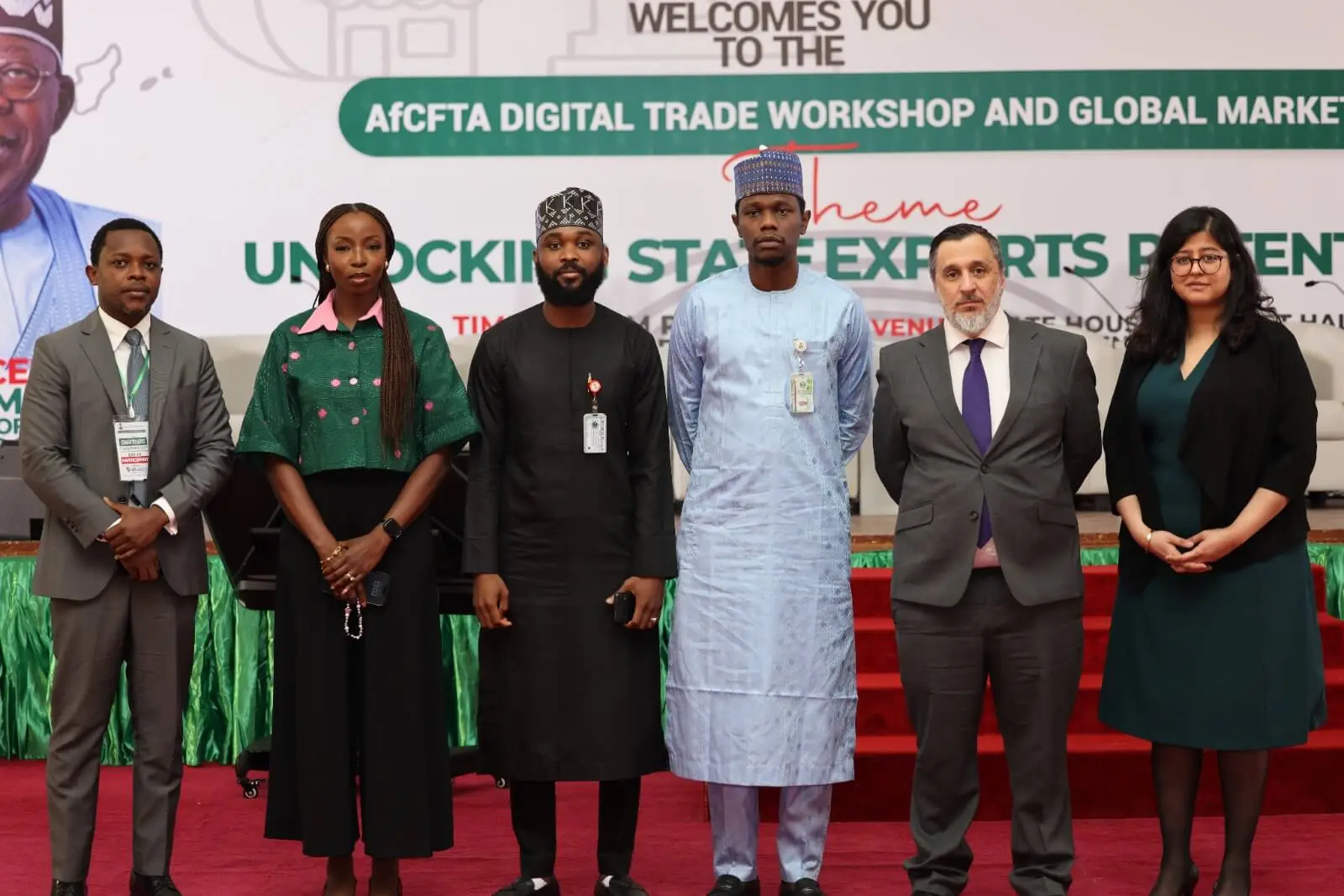Nigeria has a unique opportunity to capitalise on the benefits provided by the African Continental Free Trade Area (AfCFTA)’s Digital Trade Protocol, which is designed to integrate Africa’s fragmented markets through digital technologies, deliver savings in transaction costs for businesses, and generate new revenue streams for governments. These sentiments were echoed during a two-day AfCFTA Digital Trade Workshop and Global Markets hosted by the Office of the Vice President, Federal Republic of Nigeria and ODI Global in Abuja on February 19-20, 2025, where TradeMark Africa (TMA)’s Board Director, Lola Aworanti-Ekugo, led an insightful session on “The AfCFTA Digital Trade Protocol: Implications for Nigeria.”
Adopted in February 2024, the AfCFTA Digital Trade Protocol seeks to eliminate trade barriers, enhance connectivity, and create a seamless digital trade environment in Africa. Aworanti-Ekugo’s session deliberated on a roadmap for Nigeria’s implementation of the protocol, outlining the reforms, regulatory milestones, and digital infrastructure investments needed to unlock the country’s full trade potential through digital trade.
She emphasised the need for Nigeria to harmonise its digital trade policies, improve data governance, and strengthen consumer protection frameworks as part of the foundation for facilitating cross-border trade, enhancing the country’s competitiveness in the global digital economy, and positioning Africa as a leader in the global digital economy.
The AfCFTA Digital Trade Workshop in Lagos follows Nigeria’s recent endorsement by the African Union as the AfCFTA Digital Trade Champion at the 38th AU Assembly in Addis Ababa. The recognition highlights Nigeria’s leadership in digital enterprise and innovation, and its proactive role in implementing the AfCFTA Digital Trade Protocol, which covers areas such as rules of origin, digital identities, cross-border data transfers, online security, and fintech. The protocol is poised to drive job creation, boost Africa’s GDP, and attract major digital infrastructure investments.
TradeMark Africa’s Technical Assistant for Digital Trade, Gislain Sodogandji, highlighted TMA’s experience in implementing over 100 digital trade projects across Africa since 2010, which has benefitted entrepreneurs, particularly those engaged in cross-border or international trade. For instance, Kenya’s Integrated Customs Management System (iCMS) has reduced customs processing time from 6–48 hours to real-time approvals. Uganda’s Electronic Single Window (UeSW) has automated export and import documentation, saving $26 million in transaction costs in 2021. Similarly, Kenya’s Integrated Export and Import Certification System (IECS) has minimised administrative burdens and transaction costs by 15%.
Regional initiatives have also played a critical role in improving logistics efficiency through digital technology. The Regional Electronic Cargo Tracking System (RECTS), implemented in Kenya, Uganda, and Rwanda, provides real-time monitoring of goods in transit, reducing cargo diversion and theft. On a global scale, the Trade Logistics Information Pipeline (TLIP) uses blockchain technology to eliminate paper-based trade documentation, thereby reducing errors, costs, and time for transactions.
Other cases, such as iSOKO, an online marketplace, enable women cross-border traders in East Africa by connecting them to a wider market for their goods and services. With over 80,000 users signed onto the platform by the end of 2024, businesses utilising iSOKO in 2023 recorded significantly higher transaction values compared to those outside the platform, demonstrating the effectiveness of digital marketplaces in fostering trade growth.
The lessons from such initiatives are valuable in shaping digital strategies for African countries at national, regional, and continental levels, aligning with AfCFTA’s goal of catalysing economic integration and prosperity.
TMA’s Director of Digital Trade, Erick Sirali, noted that two major digital trade initiatives currently in the pipeline have the potential to revolutionise cross-border trade in Africa by enhancing trade facilitation, minimising bureaucratic obstacles, and improving regional trade. For instance, the customs-to-customs information exchange between Ghana and Côte d’Ivoire is set to boost cross-border trade efficiency by enabling real-time data sharing, allowing advance cargo clearance and reconciliation, reducing delays, and facilitating smoother regional trade.
The continental electronic AfCFTA Certificate of Origin (CoO), on the other hand, will digitalise and streamline the certification process, enabling businesses to acquire and share CoOs more efficiently across Africa. This will minimise paperwork, strengthen security, and facilitate seamless trade under AfCFTA guidelines, ultimately benefiting traders.


